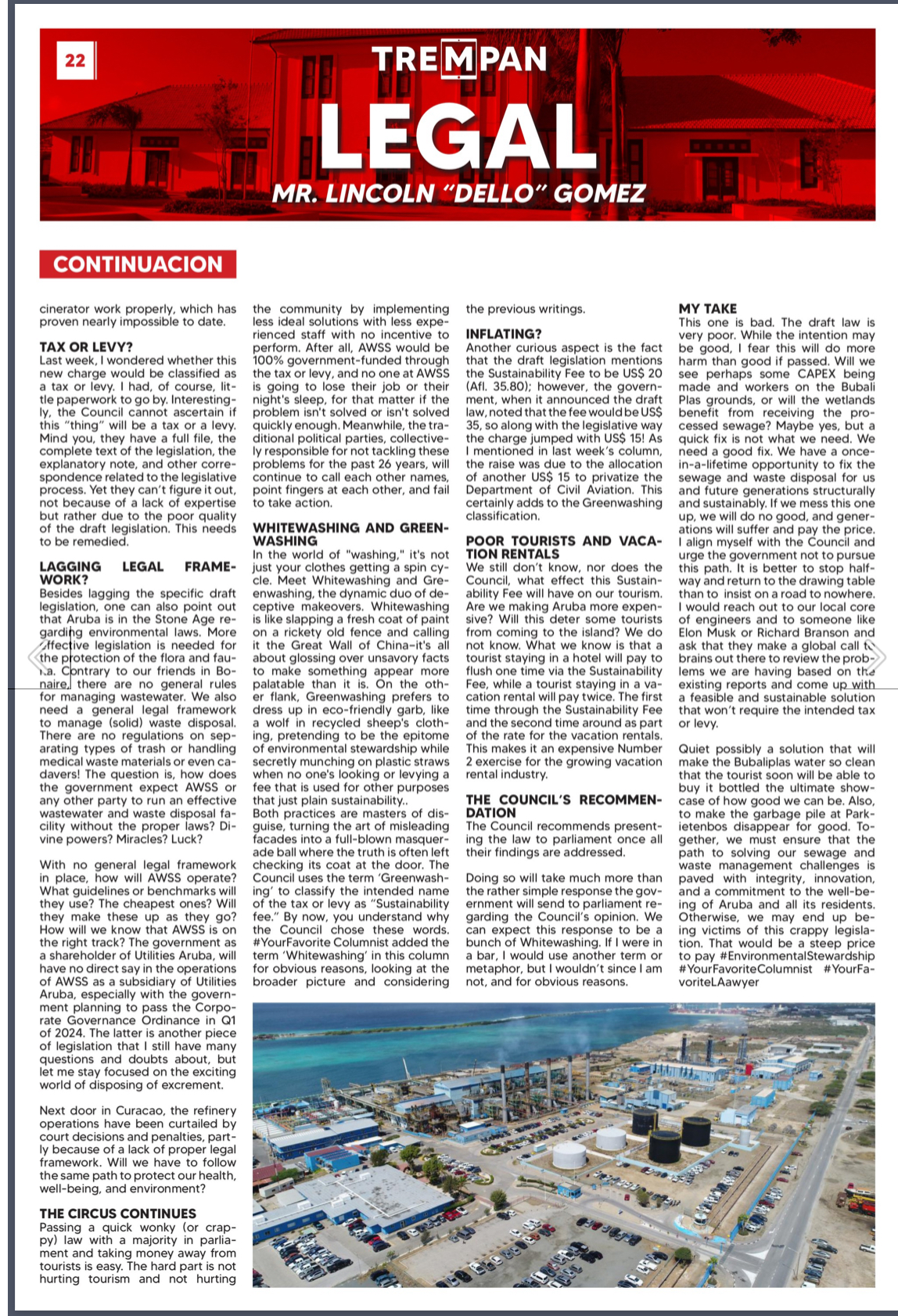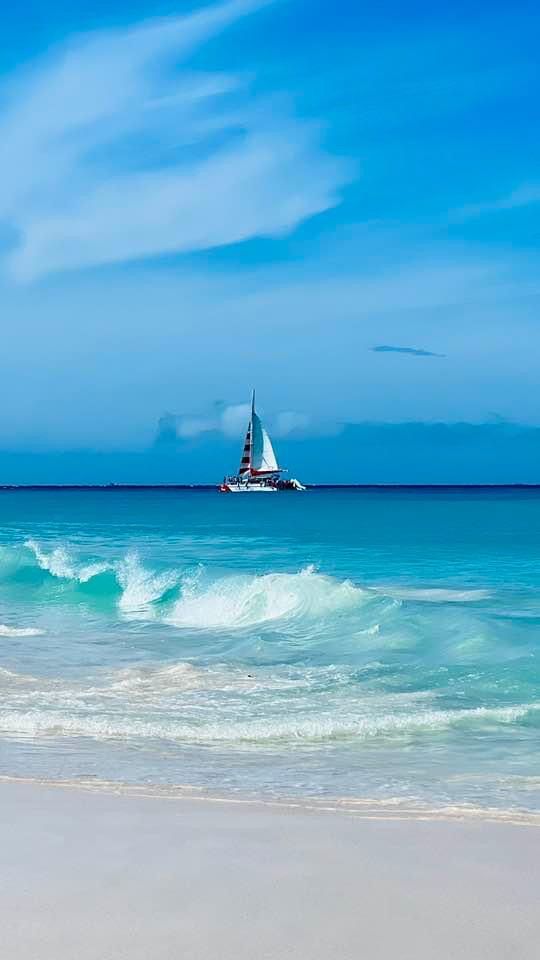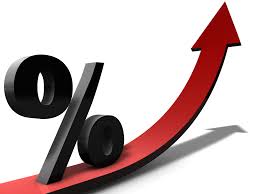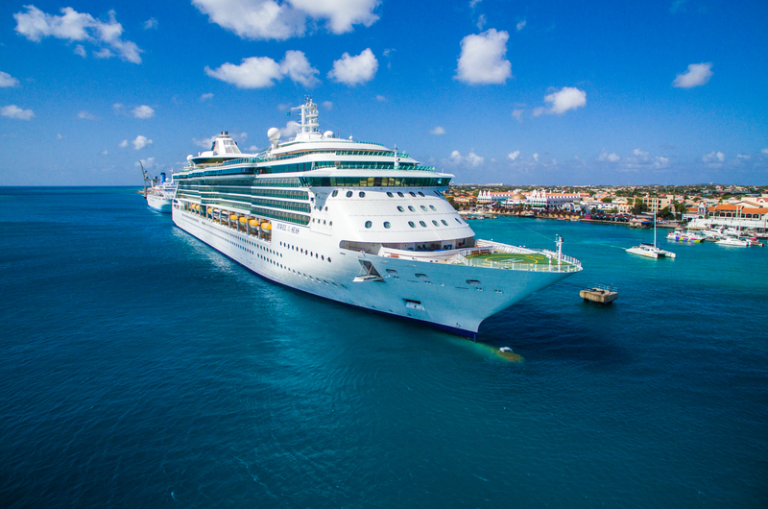Crappy Legislation: How Proposed Law Could Flush Away Aruba’s Future
Last week, I wrote about the government’s plans to introduce a tax or levy to raise capital to pay to solve the sewage issue at the Bubali Plas, aka RWZI. I mentioned that I could not access the State Council’s (Raad van Advies) opinion on the legislation. It is posted on the website but not downloadable yet. It will be once the draft legislation hits parliament. The opinion was issued on October 25th, 2023, as stated on www.rva.aw. It would have been nice to share that content with you, but don’t be alarmed; a source acting based on anonymity decided that #YourFavoriteColumnist should have some access.. To that source, a word of thanks. The content, 20 odd pages, was well researched and well written, but the findings and conclusion were somewhat nauseating. Find out why.
The Council
Before getting into the content of the opinion, let me first share a bit about the Council to put theory work and opinion into perspective. The Council serves as the paramount independent advisor to the government of Aruba on matters of legislation and governance. It operates alongside other key institutions as a distinguished entity, tasked with a unique role that it fulfills independently from the government. The Council is authorized to independently issue advice on subjects within its scope of expertise. The government may request the Council’s input on topics that may not directly fall under its usual remit. The Council comprises five members, including a president, and its operations are supported by a Scientific Bureau, which a secretary heads. This structure ensures that the Council can effectively provide informed and independent advice on legislative and administrative matters.
The government shares the draft legislation and supporting documents during the legislative process. The Council then reviews and analyzes the draft and prepares an opinion for the government. It often includes recommendations on how to optimize the legislative product. Since the Council is independent and not influenced by the government, it can also offer criticism of the draft. Responsible governments pay attention to and follow the guidance of the Council. Other governments may deem the Council more like an inconvenient aspect in the legislation process and (too often) choose to ignore the opinion in full or in part.
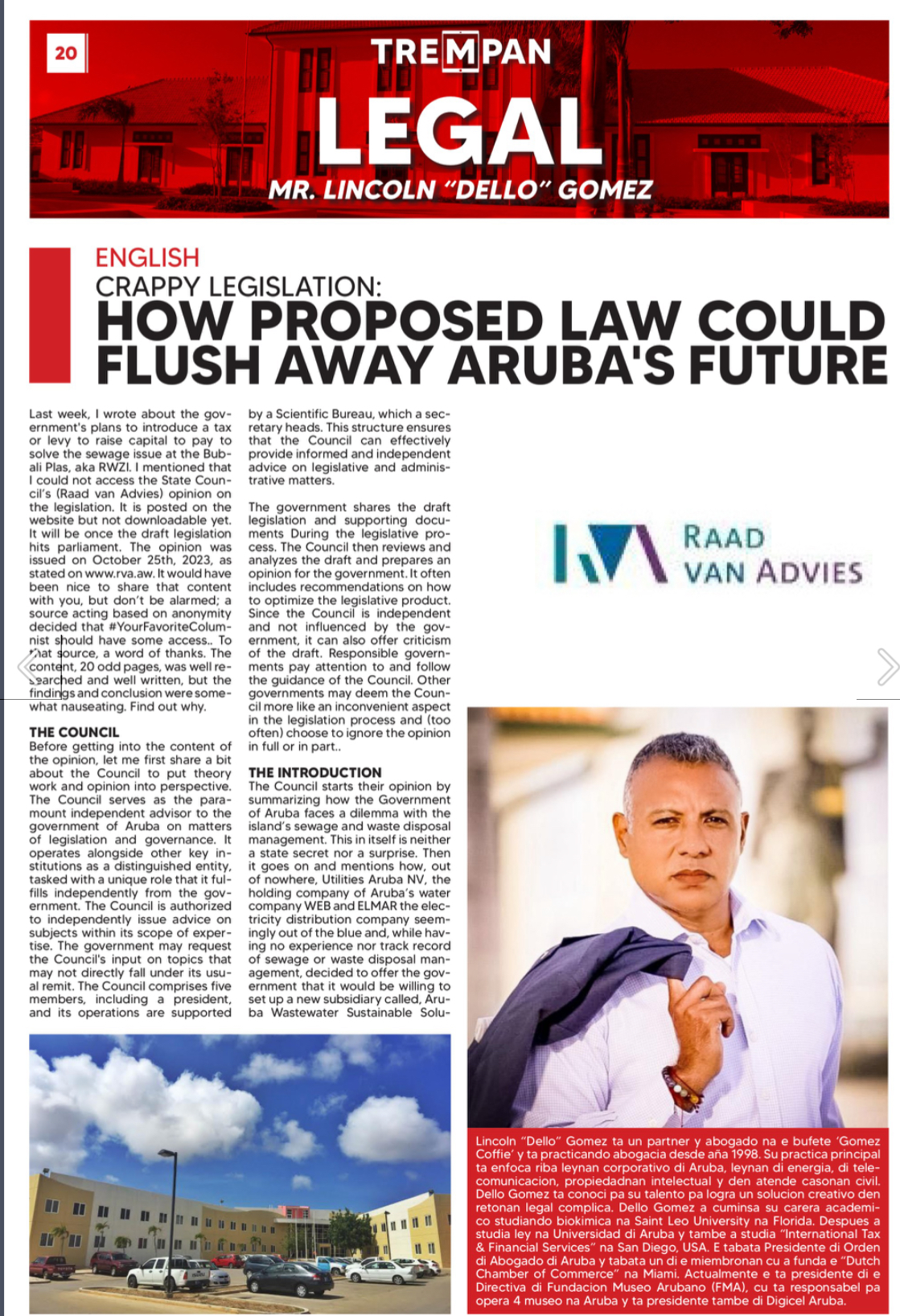
The Introduction
The Council strats their opinion by summarizing how the Government of Aruba faces a dilemma with the island’s sewage and waste disposal management. This in itself is neither a state secret nor a surprise. Then it goes on and mentions how, out of nowhere, Utilities Aruba NV, the holding company of Aruba’s water company WEB and ELMAR the electricity distribution company seemingly out of the blue and, while having no experience nor track record of sewage or waste disposal management, decided to offer the government that it would be willing to set up a new subsidiary called, Aruba Wastewater Sustainable Solutions NV (“AWSS”) and provide a magical solution overnight for both the RWZ at the Bubali Plas and the waste disposal/incinerator plant at Parkietenbos. Really?
You may recall my last article on how the court revoked the hindrance permit that the government de facto gave itself. The reality is probably that the government “ordered” Utilities Aruba to take on this Herculean task and find a way to pay for it that wouldn’t cost the government anything. Whatever the case, AWSS is going need a unique set of skills, determination, and proven technology to complete this task, and this starting from scratch or using the same staff of the Department of Public Works (DOW) that, through date, for whatever reason has not been able to manage the RWZI properly nor properly execute the incinerator at Parkietenbos. As an investor or lender, I would be careful before stepping in. Our tourism sector should be cautious and not buy in too quickly on tis “great plan that will make the stench go awa”.. As a resident I am worried about this approach. I wish AWSS all the best, but I am bracing for a nightmare and fair we can end up up to our necks in fecal matter and garbage. I fear for our well being and our nature.
Need to privatize?
The Council questioned the need for a privatization approach driven by a lack of funding from the government. The Council commented, based on the government budget for 2023, 2024, and up to 2026, that the government would have enough funds available to fund the RWZI substantially or fully. In addition, the Council also points out the existence of the Sewage Ordinance. A law that has been on the books of for decades and that allows the government to charge property owners for sewage disposal. In June of 2023, I wrote about this law and wondered how much revenue that law created and how that money was spent. I wondered because I do not know or have access to that information. The Council clarified this. The law has NOT been implemented! There now we we know why the sewage management is such a mess. The government now wants to privatize the operations and pass the cost on to the tourists because the government(s) failed to use the legal instruments of the Sewage Ordinance to collect.
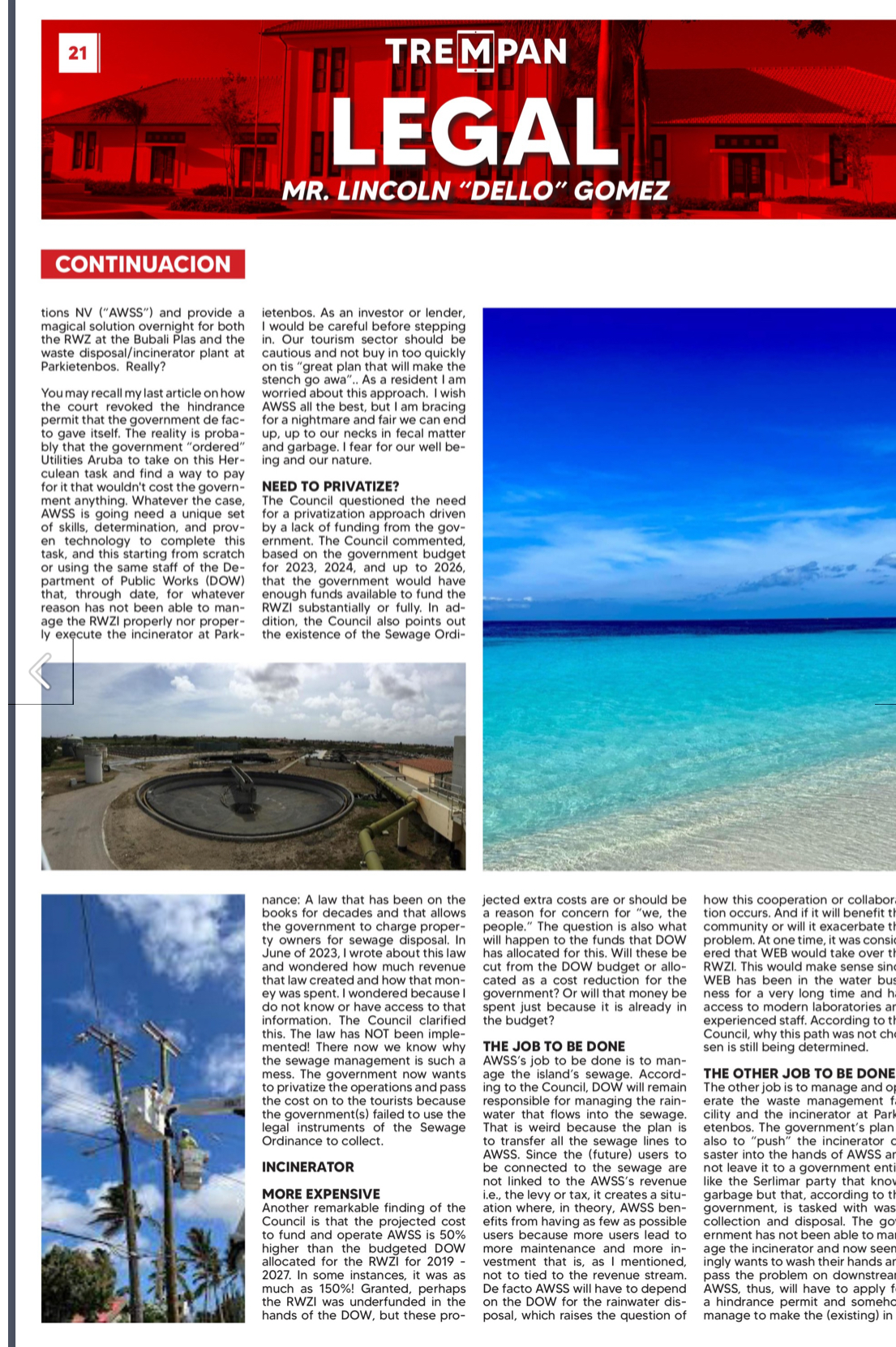
More expensive
Another remarkable finding of the Council is that the projected cost to fund and operate AWSS is 50% higher than the budgeted DOW allocated for the RWZI for 2019 – 2027. In some instances, it was as much as 150%! Granted, perhaps the RWZI was underfunded in the hands of the DOW, but these projected extra costs are or should be a reason for concern for “we, the people.” The question is also what will happen to the funds that DOW has allocated for this. Will these be cut from the DOW budget or allocated as a cost reduction for the government? Or will that money be spent just because it is already in the budget?
The job to be done
AWSS’s job to be done is to manage the island’s sewage. According to the Council, DOW will remain responsible for managing the rainwater that flows into the sewage. That is weird because the plan is to transfer all the sewage lines to AWSS. Since the (future) users to be connected to the sewage are not linked to the AWSS’s revenue i.e., the levy or tax, it creates a situation where, in theory, AWSS benefits from having as few as possible users because more users lead to more maintenance and more investment that is, as I mentioned, not to tied to the revenue stream. De facto AWSS will have to depend on the DOW for the rainwater disposal, which raises the question of how this cooperation or collaboration occurs. And if it will benefit the community or exacerbate the problem. At one time, it was considered that WEB would take over the RWZI. This would make sense since WEB has been in the water business for a very long time and has access to modern laboratories and experienced staff. According to the Council, why this path was not chosen is still being determined.
The other job to be done
The other job is to manage and operate the waste management facility and the incinerator at Parkietenbos. The government’s plan is also to “push” the incinerator disaster into the hands of AWSS and not leave it to a government entity like the Serlimar party that knows garbage but that, according to the government, is tasked with waste collection and disposal.The government has not been able to manage the incinerator and now seemingly wants to wash their hands and pass the problem on downstream. AWSS, thus, will have to apply for a hindrance permit and somehow manage to make the (existing) incinerator work properly, which has proven nearly impossible to date.
Tax or levy?
Last week, I wondered whether this new charge would be classified as a tax or levy. I had, of course, little paperwork to go by. Interestingly, the Council can not ascertain if this “thing” will be a tax or a levy. Mind you, they have a full file, the complete text of the legislation, the explanatory note, and other correspondence related to the legislative process. Yet they can’t figure it out, not because of a lack of expertise but rather due to the poor quality of the draft legislation. This needs to be remedied.
Lagging legal framework?
Besides lagging the specific draft legislation, one can also point out that Aruba is in the Stone Age regarding environmental laws. More effective legislation is needed for the protection of the flora and fauna. Contrary to our friends in Bonaire, there are no general rules for managing wastewater. We also need a general legal framework to manage (solid) waste disposal. There are no regulations on separating types of trash or handling medical waste materials or even cadavers! The question is, how does the government expect AWSS or any other party to run an effective wastewater and waste disposal facility without the proper laws? Divine powers? Miracles? Luck?
With no general legal framework in place, how will AWSS operate? What guidelines or benchmarks will they use? The cheapest ones? Will they make these up as they go? How will we know that AWSS is on the right track? The government as a shareholder of Utilities Aruba, will have no direct say in the operations of AWSS as a subsidiary of Utilities Aruba, especially with the government planning to pass the Corporate Governance Ordinance in Q1 of 2024. The latter is another piece of legislation that I still have many questions and doubts about, but let me stay focused on the exciting world of disposing of excrement.
Next door in Curacao, the refinery operations have been curtailed by court decisions and penalties, partly because of a lack of proper legal framework. Will we have to follow the same path to protect our health, well-being, and environment?
The circus continues
Passing a quick wonky (or crappy) law with a majority in parliament and taking money away from tourists is easy. The hard part is not hurting tourism and not hurting the community by implementing less ideal solutions with less experienced staff with no incentive to perform. After all, AWSS would be 100% government-funded through the tax or levy, and no one at AWSS is going to lose their job or their night’s sleep, for that matter if the problem isn’t solved or isn’t solved quickly enough. Meanwhile, the traditional political parties, collectively responsible for not tackling these problems for the past 26 years, will continue to call each other names, point fingers at each other, and fail to take action.
Whitewashing and greenwashing
In the world of “washing,” it’s not just your clothes getting a spin cycle. Meet Whitewashing and Greenwashing, the dynamic duo of deceptive makeovers. Whitewashing is like slapping a fresh coat of paint on a rickety old fence and calling it the Great Wall of China—it’s all about glossing over unsavory facts to make something appear more palatable than it is. On the other flank, Greenwashing prefers to dress up in eco-friendly garb, like a wolf in recycled sheep’s clothing, pretending to be the epitome of environmental stewardship while secretly munching on plastic straws when no one’s looking or levying a fee that is used for other purposes that just plain sustainability.. Both practices are masters of disguise, turning the art of misleading facades into a full-blown masquerade ball where the truth is often left checking its coat at the door. The Council uses the term Greenwashing to classify the intended name of the tax or levy as “Sustainability fee.” By now, you understand why the Council chose these words. #YourFavorite Columnist added the term Whitewashing in this column for obvious reasons, looking at the broader picture and considering the previous writings.
Inflating?
Another curious aspect is the fact that the draft legislation mentions the Sustainability Fee to be US$ 20 (Afl. 35.80); however, the government, when it announced the draft law, noted that the fee would be US$ 35, so along with the legislative way the charge jumped with US$ 15! As I mentioned in last week’s column, the raise was due to the allocation of another US$ 15 to privatize the Department of Civil Aviation. This certainly adds to the Greenwashing classification.
Poor tourists and vacation rentals
We still don’t know, nor does the Council, what effect this Sustainability Fee will have on our tourism. Are we making Aruba more expensive? Will this deter some tourists from coming to the island? We do not know. What we know is that a tourist staying in a hotel will pay to flush one time via the Sustainability Fee, while a tourist staying in a vacation rental will pay twice. Once via the Sustainability Fee and the second time around as part of the rate for the vacation rental. This makes it an expensive Number 2 exercise for the growing vacation rental industry.
The Council’s Recommendation
The Council recommends presenting the law to parliament once all their findings are addressed. Doing so will take much more than the rather simple response the government will send to parliament regarding the Council’s opinion. We can expect this response to be a bunch of Whitewashing. If I were in a bar, I would use another term or metaphor, but I wouldn’t since I am not, and for obvious reasons.
My take
This one is bad. The draft law is very poor. While the intention may be good, I fear this will do more harm than good if passed. Will we see perhaps some CAPEX being made and workers on the Bubali Plas grounds, or will the wetlands benefit from receiving the processed sewage? Maybe yes, but a quick fix is not what we need. We need a good fix. We have a once-in-a-lifetime opportunity to fix the sewage and waste disposal for us and future generations structurally and sustainably. If we mess this one up, we will do no good, and generations will suffer and pay the price. I align myself with the Council and urge the government not to pursue this path. It is better to stop halfway and return to the drawing table than to insist on a road to nowhere. I would reach out to our local core of engineers and to someone like Elon Musk or Richard Branson and ask that they make a global call to brains out there to review the problems we are having based on the existing reports and come up with a feasible and sustainable solution that won’t require the intended tax or levy. Quiet possibly a solution that will make the Buabli Plas water so clean that the tourist soon will be able to buy it bottled the ultimate showcase of how good we can be. Also to make the garage pile at Parkieten bos disappear for good. Together, we must ensure that the path to solving our sewage and waste management challenges is paved with integrity, innovation, and a commitment to the well-being of Aruba and all its residents. Otherwise, we may end up being victims of this crappy legislation. That would be a steep price to pay #EnvironmentalStewardship #YourFavoriteColumnist #YourFavoriteLawywer
https://direct.me/lincolngomez
